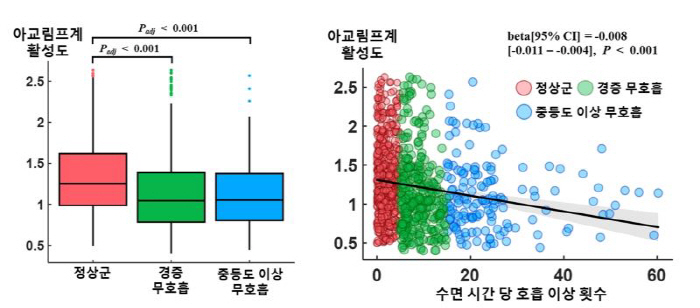Dementia-induced sleep apnea causes decreased brain waste discharge function
Oct 27, 2025
|
A joint research team led by Professor Yoon Chang-ho of the Department of Neurology at Seoul National University Bundang Hospital, Professor Shin Chul of the Human Genomics Research Institute at Korea University Medical School, and Robert Thomas of the Department of Sleep Medicine at Beth Israel Hospital at Harvard Medical School said that obstructive sleep apnea causes cognitive decline by lowering the brain's waste discharge function.
Obstructive sleep apnea, which stops breathing for a while when sleeping, is a disease that causes hypoxia and frequent arousal, making it difficult to sleep normally, and it is known that long-term neglect greatly increases the risk of degenerative brain diseases such as cognitive decline and dementia.
However, it is not clear what physiological process causes degenerative changes in the brain beyond simply lack of oxygen or poor sleep quality.
The research team estimated that the deterioration of the 'glymphatic system' function has a key effect in the process of sleep apnea leading to cognitive decline, and tried to verify this by following up 1,110 adults who participated in the Korean Genome Dynamics Survey (KoGES) for an average of 4.2 years. The glue lymph system is a system that discharges various waste products accumulated in the brain, including beta-amyloid, which causes Alzheimer's disease, and works most actively when sleeping deeply.
As a result of the study, patients with sleep apnea had a significantly lower activity index (DTI-ALPS score) of the glial lymphatic system observed in MRI, and as a result, the visual memory score', which evaluates how well people and scenes are remembered, also clearly decreased. It can be interpreted that sleep apnea did not directly cause cognitive decline, but that the indirect path through the deterioration of glial lymphatic function had a greater impact.
The more severe sleep apnea became, the stronger this pattern became, and on the contrary, patients with improved sleep apnea due to positive pressure treatment and improved lifestyle showed a tendency to restore glial lymphatic activity and memory.
This study is meaningful in that sleep apnea causes a decrease in the brain's waste discharge function during sleep, which finally identifies a causal path leading to cognitive decline. It also suggests that active intervention such as positive pressure treatment is needed to prevent dementia in sleep apnea patients, which is expected to be an important basis for preparing future treatment guidelines.
Professor Yoon Chang-ho said, `A long-term observational study on the principle and path of obstructive sleep apnea, which greatly reduces the quality of sleep, causes cognitive decline.' `We need to keep in mind that good sleep is the way to protect brain health and be alert about sleep apnea.'
Meanwhile, the study was published in the renowned international journal 『American Journal of Respiratory Critical Care Medicine』 (IF 19.4).
|
This article was translated by Naver AI translator.















